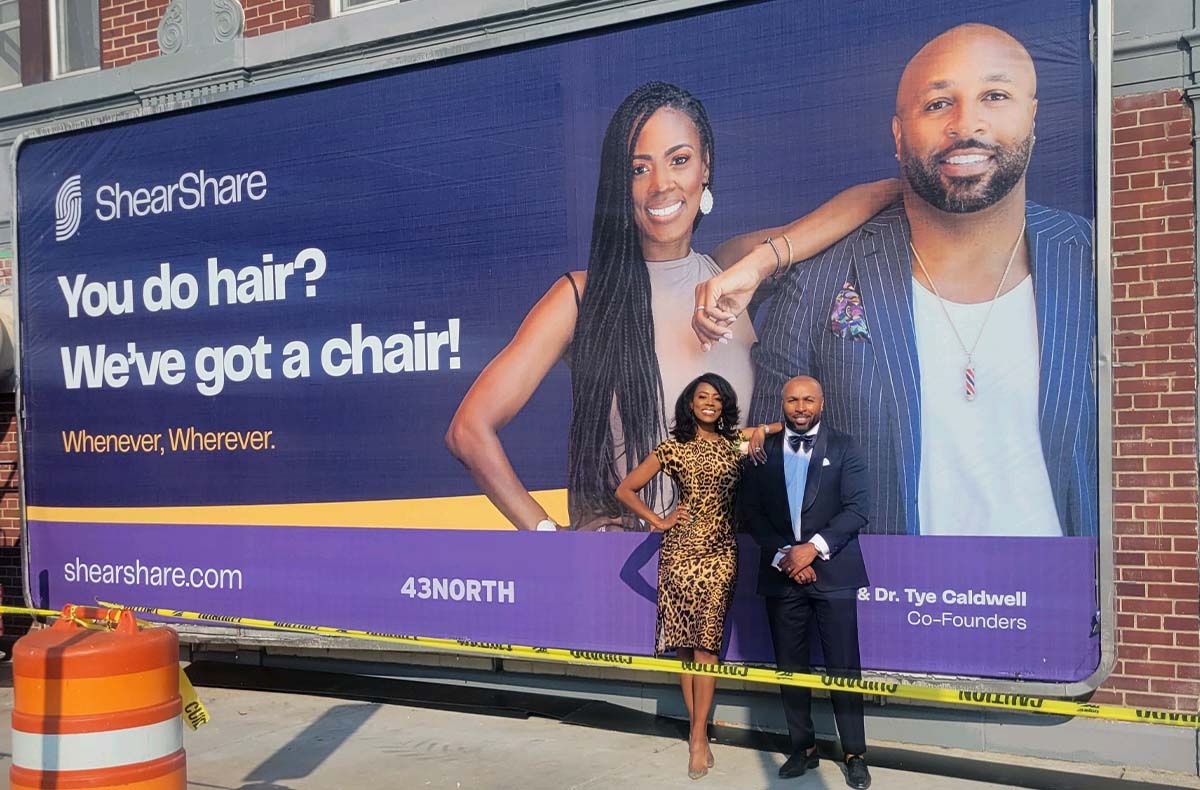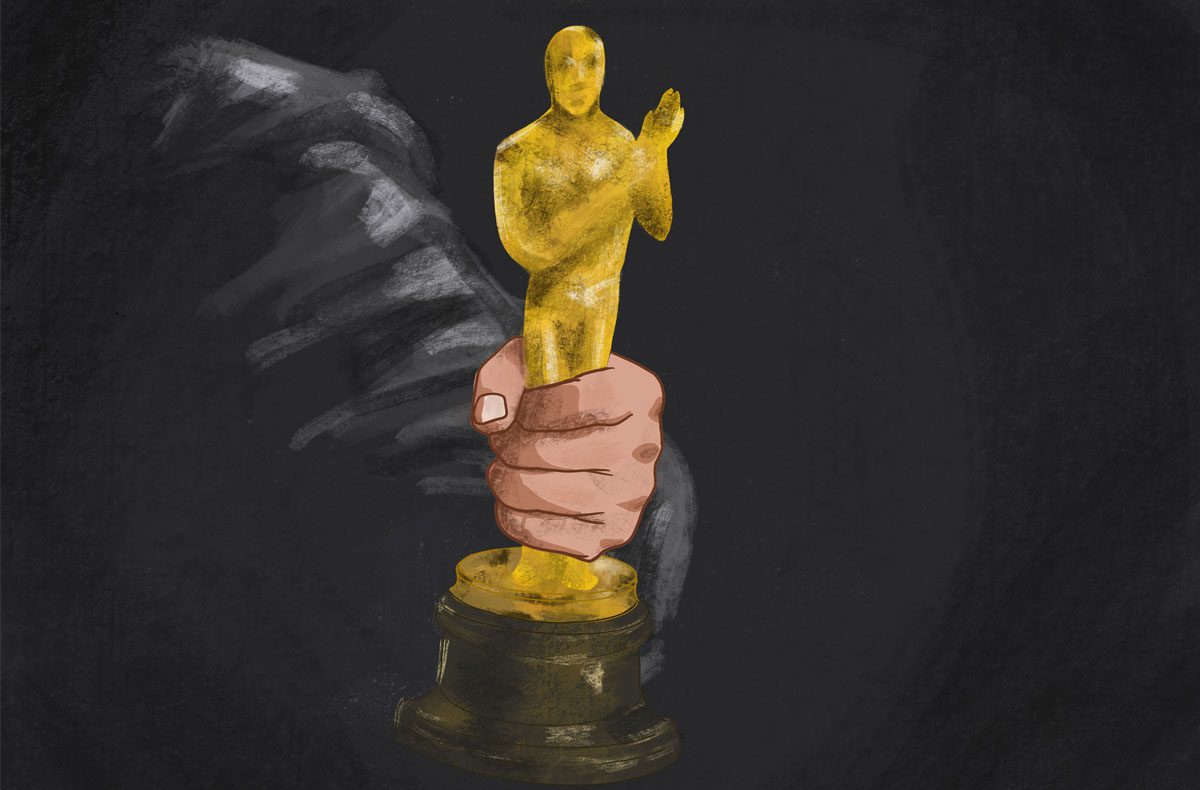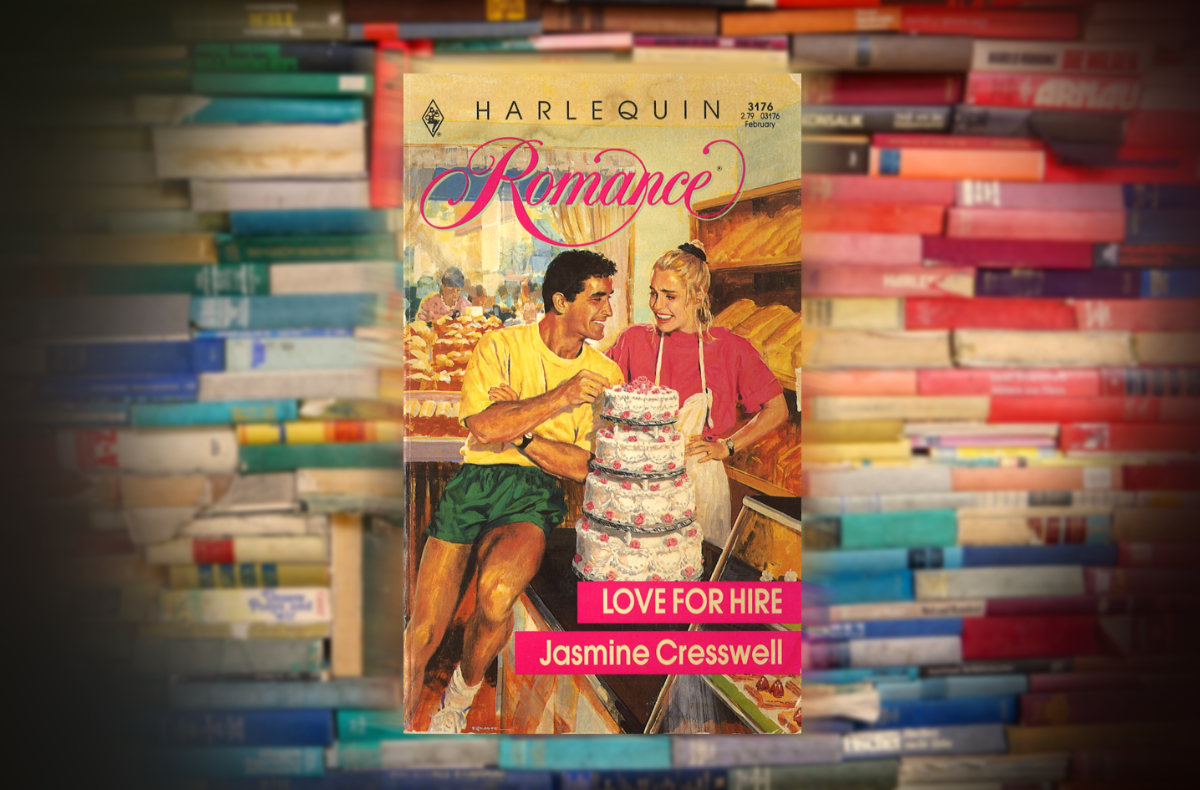
Photo Courtesy of ShearShare
Courtney Caldwell is the Co-founder and COO of ShearShare, an app affectionately known as “HairBNB.” According to the company, it is the first app that allows hair stylists, nail technicians, barbers, makeup artists, estheticians, braiders, and microblading artists to rent professional salon and barbershop space by the day, week, or month in cities all over the world.
As COO, Caldwell is responsible for the marketing, administration, legal, and HR operations of ShearShare. Her co-founder is her husband, Dr. Tye Caldwell, a celebrity barber and hairstylist who handles the hiring, sales, and product development at ShearShare.
The Caldwells are also owners of an award-winning beauty and barber salon in Plano, Texas, Salon74 by Tye. It’s been in business for 27 years and is where the seed for ShearShare was first planted. In 2012, a stylist called the salon and asked if she could rent space on a Friday or Saturday. Since salons generally work on long-term booth rental contracts or shared commissions, the request was unusual. But Dr. Caldwell decided—why not? Better to have a one-day rental than an unused suite collecting dust. The stylist had such a great experience, she told her friends, and soon the Caldwells found themselves acting as an informal concierge service, connecting salons and stylists in the city and beyond. However, manually matching stylists with shops got tedious after a few years, and the duo was certain there had to be an app out there that would make it easier to connect both sides and fill empty salon space. To their surprise, there wasn’t—so the couple decided to create one: and ShearShare was born.

Caldwell spoke to New Thinking’s Editor-at-Large, Zorianna Kit, on why the app struck a chord in the beauty industry, how her faith plays into her success, and what it means to be a Black woman running a successful tech business.
Zorianna Kit: Thanks for taking the time to talk to New Thinking! For those who may not know how hair salons work behind the scenes, tell us how the traditional revenue model works and how ShearShare upends that in a way that benefits both the salon owner and the stylist.
Courtney Caldwell: The traditional model of a salon and barbershop is that I, the owner, may have an average of eight different stations or chairs, for example. I do the buildout and cover the overhead. I pay for the magazines, the bottles of water for the clients, the shampoo and conditioner at the back bar. I generate new clients for you, provide the washer and dryer to clean the towels, the receptionist, and the POS system to check out clients. When you, as the stylist, come into my salon, you work by commission. I have already negotiated with you what that split will be. Typically, it is around 70/30 or 60/40, where for every haircut or hair color you do, you pay me because I have taken over the brunt of running the business.
ZK: There is also another model of renting a booth. How does that work?
Caldwell: Yes. Instead of sharing in the commission, you, as the stylist, are paying me rent to use that chair. You have signed a long-term booth rental contract for one year, five years, ten years… The downside is that you’re tied to that one salon and that one station. If that culture isn’t a fit for you, or your clients don’t like it, unless you want to break your contract, you’re stuck. And even though you’re not working seven days a week, your booth rental pays for the space, even when you’re not there, so that’s money wasted.
ZK: How does ShearShare help stylists?
Caldwell: ShearShare is the first app where stylists can customize their workspace. For example, you can say, “I’m cutting all my male clients’ hair on Fridays, so I’m going to choose a men’s grooming location for that day. Maybe something with a sports vibe where there’s a game playing on a screen, and the place serves free beers. When I service all my “ladies who lunch” on Saturday, I’ll work in a salon with luxe chandeliers that offer glasses of champagne when you walk in.” The app lets a stylist be laser-focused on providing the best user experience. At the same time, they are not locked in. They can build a book of business in different cities and have the flexibility and freedom to do what they love, whenever and wherever.
ZK: What about the salons? What’s in it for them with the app?
Caldwell: In our industry, 40% of empty chairs sit idle every single day, so ShearShare helps salons and barbershops monetize their excess capacity. As a salon owner, you don’t have to panic and say, “I have eight chairs, but I’ve only filled two.” Put the other six on ShearShare, and we will find you a licensed beauty or barbering professional with their own clientele who just needs a professional space to work. It’s a win-win.
ZK: When you started ShearShare, what were some of the expected challenges you knew you would be facing and what were the unexpected challenges?
Caldwell: The obvious challenge was that neither myself nor my husband are coders. We are not “technical co-founders,” as they say. Of course, he is the subject matter expert on all things beauty and barbering, I am the subject matter expert for all things marketing and operations. That third element was missing, though, which was the tech arm. So we went out and found someone to build an MVP of our app, a Minimally Viable Product, which means the most basic platform you can create for somebody to transact on the app.
ZK: What were the unexpected challenges?
Caldwell: You don’t know what you don’t know. There were things we didn’t consider when we began building the app and the company. Questions like, do we want it to be a mobile app or a web-based app where someone can make a reservation on their desktop? Do we need to hire sales first or customer service? Where do we launch the business? Do we bring on salons in Dallas because that’s where we are, or do we go to a place like LA or New York because those cities are often early adopters when it comes to the Ubers and the Lyfts and the Airbnbs and whatnot?
ZK: As a Black CEO and COO couple, was race ever a factor when building your business?
Caldwell: That’s a great question. Whenever my husband and I leave the comfort of our home, anyone who sees us out in the world sees us as Black. No one would look at me and say, “Her African bloodline actually includes German and Native American.” They look at me and say, “That’s a Black woman right there.” Immediately we are put in the minority box and treated differently. But we’ve always known that growing up. It’s never been a secret. How to navigate the world as a Black person is something we are taught from a very young age in our families. You learn to be very cautious and mindful of how you move in spaces. So to answer your question bluntly, absolutely, this business could have been built faster and impacted more lives. We probably could have raised ten times the amount of money we have raised if race was not a factor. Absolutely.
ZK: How do you reconcile that truth as you navigate and build your business?
Caldwell: I still wouldn’t do it any other way. If we are taking on this challenge, this is our problem to solve. This is our legacy to leave for the millions of hairstylists and barbers and nail technicians, and salon owners that are out there. Not just in America, but in the world. If that is our cross to bear, that becomes our why. We are resilient in fighting the good fight every day because what we’re building is so much bigger than us.
ZK: Are you conscious of being a role model to others in your community?
Caldwell: Definitely. We were just in the October/November 2022 issue of Entrepreneur Magazine—the one with Jennifer Lopez on the cover. ShearShare is featured on page 20. It’s not just that a large media conglomerate thought enough to highlight the founders of ShearShare. It is knowing that a young Black girl or boy is going to pick up that magazine because they saw it on their parents’ desk or at the barbershop, see the article and say, “I can be a tech founder.” They see a picture of myself and Tye and say, “that can be me.”
ZK: You have mentioned before that ShearShare is not your first start-up. Can you explain?
Caldwell: As I live in this world, I’m doing what we, as women, are naturally gifted to do: build something from nothing and nurture something into existence. In that case, my marriage is my first startup, which was an amazing merger. My husband and I still enjoy each other. Heck, we live, work, play, and dream together every single day! One of the reasons we have such a happy marriage is because we constantly set goals with each other and for ourselves. We’re on the same train going in the same direction. Some couples grow apart, but we need to be aligned in order for us to work and for the business to work.
ZK: And the second startup?
Caldwell: Our second startup is our son. I always joke that, because he’s a senior at the United States Air Force Academy, he’s been acquired.
ZK: I hope that was a good acquisition deal for you!
Caldwell: It was! That young man is going to be a pilot, and I cannot be any more proud of him. He’s an officer and a gentleman! So here we are now, with ShearShare as our third startup, breathing life into something that didn’t exist before, nurturing it to make a significant impact on the people around it and the community it lives in. We’re doing what we have been doing all along. It just has a different name.
ZK: You were raised Baptist, attended Catholic schools as a child, an Episcopalian military high school, and a Methodist University. You also worked full-time in ministry. How does faith play into your work?
Caldwell: My faith has certainly served as an undercurrent in all my endeavors. It is the bedrock on which I stand. It is me absolutely knowing that there is a God who exists. It is me knowing that I am sent here to make sure that I leave people, places, and things better off than when I found them. It is the fabric of my DNA. It is also a competitive advantage, to be honest with you. I understand that regardless of what the world tells me, regardless of what I may be experiencing now, good or bad, I know there is a bigger reason for it. I’m a much better person because of my faith. My mother would always say, “if you’re going to worry, don’t pray. If you’re going to pray, don’t worry.” The older I get, the more I see that it is true. Why spend my time worrying when I can spend my time making an impact?
ZK: Describe your leadership style.
Caldwell: My husband and I are different kinds of leaders for a different kind of generation. We are more in tune with the soft skills of an individual. Not just their IQ, but their emotional quotient. My husband has a great gift of discernment. He’s very good at being able to identify the right people and being able to say, “I see a gap here in your leadership qualities. Let me help build you up and guide you to be the best person you can be.” I lean on the nurturing side. I’ll hug you when you’re hurting but will also be very direct when you’ve screwed up. When I look at a person, I see all of them. I don’t just see a customer service agent or a head of product, or CTO. I see the complete individual. At my core, my spirit wants to respond to that person in the way they most need to be heard.
ZK: This brings to mind the concept of building a brand. What is a brand but an extension of the brand owner and their values?
Caldwell: Yes! A million times over. Any employee or customer who has talked with Dr. Tye, me, or a team member is going to know that what we represent at ShearShare is really from the heart of the Caldwells. As I said, this is our third startup. It’s our heart. When people see us, they see ShearShare. When people see ShearShare, they see the people behind it.
ZK: Are there reading materials, videos, or podcasts you read or listen to for advice or inspiration? What’s your favorite book, for example?
Caldwell: What Happy People Know: How the New Science of Happiness Can Change Your Life for the Better by Dan Baker, PhD. It is by far one of my favorite books. In it, the author talks about the brain, the amygdala, the neocortex, etc., and there is this thing he calls “The Quarter Second Rule.” He explains that we all have a quarter of a second before we respond to fight or flight. In that quarter second, we can change our minds and choose something different, something that can change the trajectory of the situation we’re in. That’s so powerful to me.
ZK: Do you have a favorite podcast?
Caldwell: Your First Million by Arlan Hamilton. She’s one of our ShearShare investors. She is a Black female and gave us our first VC check. In her podcast, she talks to different people about how they got to their first million—a million dollars, a million followers, a million cities. It’s really inspiring and uplifting.
ZK: Do you have any go-to people you follow on social media and listen to when they do interviews or give out advice?
Caldwell: One of my favorites right now is Master P. Most people know him as a rapper, but he’s a business mogul. When you listen to him in interviews, he not only puts a big emphasis on family, but the way he looks at business is incredible. He’s impacting local communities and mentoring the next generation. Any opportunity to listen to him speak or share business advice, I’m there.
ZK: What does “new thinking” mean to you?
Caldwell: Every day, I ask God to renew my mind. That is because as a Black female in America, a Black female in tech, a Black female anywhere, I have often been told to do something other than what I wanted. Maybe I wanted to speak up in a meeting but was told, “no, it’s not your time to talk.” Maybe I had a great idea, and someone said, “no, we don’t trust your ideas, just do the work.” Every day of my life, I’ve been told to do something other than what I wanted to do instinctively. New thinking to me is being free to express myself and do those things that I know I was innately gifted to do. Every day I remind myself that what I’m doing is what I’m supposed to be doing. Does it mean that there will be hardships? Yeah, maybe. But guess what? You’re going to eventually round the corner, figure it out, and it will be a better day.


